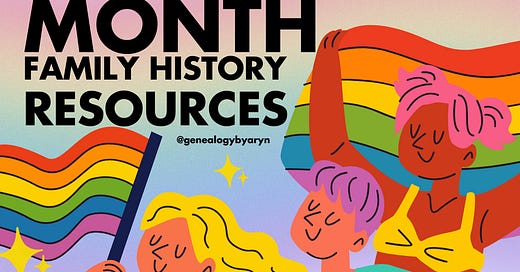It’s June, and that means PRIDE!
It’s easy to overlook the queer community when researching your family history. Vital records are not known for having a box to tick off identifying ancestors’ sexual identity, which means a big part of researching family history for possible queer relatives is knowing where to look.
Here are some resources to help you learn more about your LGBTQ+ ancestors:
VITAL RECORDS
Yes, it’s true! Some vital records hold clues about possible queer relatives. The answers won’t be spelled out - so look for same-sex couples who may be listed as “roommates” or “boarders” who live with a person of the same sex or with a married couple for a long period of time. This is not a 100% identity of queer relatives, but it can help point you in the right direction.
DIARIES, LETTERS, & PHOTOGRAPHS
This may be the best way to learn of an ancestor who identified as queer. Letters and diaries contain our ancestor’s most personal thoughts and feelings. While many of these items may have been lost or destroyed, it is possible to find old letters, diaries, and photographs on sites like eBay or DeadFred.com. Dead Fred showcases old photos, where eBay is known for helping sellers have a platform for found items - like letters and diaries. Other sources to check are Genealogical Societies, Historical Societies, and local libraries, which inherit old photos, letters, diaries, and more. Google for societies and libraries in the location you’re researching.
CRIMINAL RECORDS
With so many countries, cities, and states having anti-LGBTQ laws - one resource for locating possible relatives is in criminal records. Sites like FamilySearch and Ancestry house databases full of old court and criminal records. One charge affiliated with anti-queer laws is “tea-rooming,” and another is “cottaging” (British slang). Learn more about it here.
WEBSITES
Here are some specific websites to help with your research:
Teaching LGBTQ History - …”is dedicated to “Teaching LGBTQ History,” which primarily focuses on providing resources and materials that fulfill the requirements put forth by the FAIR Education Act with regards to LGBTQ history.”
Digital Transgender Archive: Offers trans history which provides context and timelines to your family history research.
LGBTQ Religious Archives Network: “The LGBTQ Religious Archives Network (LGBTQ-RAN) is an innovative venture in preserving history and encouraging scholarly study of lesbian, gay, bisexual, transgender, and queer (LGBTQ) religious movements around the world. LGBTQ-RAN has a two-fold basic purpose.”
QUIST app: “…a free app for iPhone, iPad, and Android phones that brings lesbian, gay, bisexual, transgender, and queer (LGBTQ) and HIV history to life.”
Locating and identifying queer relatives can be difficult, but it is not impossible. Plus, it’s important to research and build on family trees without bias or presentism.
Head over to The Board for Certification for Genealogists to learn more!
Until next time!





